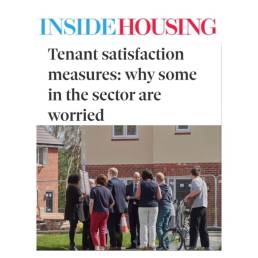Tenant satisfaction measures: why some in the sector are worried – Inside Housing, 14 December 2022
The RSH has listed 22 tenant satisfaction measures that social landlords will be judged against. Stephen Delahunty finds out how landlords are feeling about it
From April, all social landlords in England will have to collect this TSM data and submit it to the Regulator of Social Housing (RSH).
“One of the most pressing issues that came out of Grenfell was that feeling that they [tenants] couldn’t make their voices heard,” explains Donna McCarthy, partner at law firm Devonshires. “So the TSMs are really about trying to amplify their voice and communicate in ways that are meaningful and put issues affecting tenants into some context.”
But exactly what data are they collecting? And why are some in the sector still ambivalent about them?
The TSMs, which will be collected through tenant surveys and landlord data, will cover five main themes: repairs, building safety, effective complaint-handling, respectful and helpful tenant engagement, and responsible neighbourhood management.
Geeta Nanda, chair of the G15 and chief executive of Metropolitan Thames Valley, says that the “more standardised methodologies will help to ensure consistency and allow for meaningful benchmarking”.
The Social Housing Regulation Bill is making its way through parliament and provides the legal basis for many of the changes set out in the Social Housing White Paper, which was published in November 2020.
Scrapping the serious detriment test and the introduction of a new inspections programme are among a raft of changes in the white paper, alongside the TSMs.
The TSM consultation on the changes received 1,098 responses, including from social housing tenants, shared owners, councils and housing associations.
As a result, the regulator has made some changes. For example, the regulator had intended to survey all tenants on their landlord’s complaint-handling, but received comments that this would include the views of tenants who had not made a complaint.
But some are still concerned that there are flaws in the TSMs. Nicole Sharp, chief customer officer at Sovereign, says: “My concern is there will be an indicator of perception in the surveys, which might not capture the reality around the service. So it’s not just the measures themselves, it’s about what the regulator ends up doing with them and if they become too much of a blunt tool.”
Ashley Bryant, customer service and revenue director at L&Q, highlights another issue of accessibility. “It’s essential that information is communicated in an appropriate tone and using a range of channels to meet the needs of a diverse resident base. The success of the TSMs will be defined by this as much as regulatory box-ticking by submitting data.”
Ms McCarthy at Devonshires speculates that the TSMs could become a tool to hammer the sector and deliver some unintended consequences.
“Is a high volume of complaints a bad thing or a good thing?” she asks. “Landlords not carrying out their safety inspections – that’s a hard number and that is very clear. So there is a problem that I don’t think it’s clear what they’re [the regulator] hoping to measure.”
Ms McCarthy suggests that the TSMs could dissuade landlords from proactively trying to acquire or maintain stock that has a history of anti-social behaviour (ASB), as the TSMs could create less incentive to take it on. She admits this was unlikely to be the case, but in response to consultation feedback and government guidance, the RSH changed the definition of ASB cases to exclude domestic abuse and to include hate incidents.
The TSM on repairs being completed within target timescales was also changed to include emergency as well as non-emergency repairs.
Anne-Marie Bancroft, principal consultant and consumer regulation lead at Altair, says there is a danger that landlords could look for “quick wins through responsive repairs rather than investing in their stock”.
Ms Bancroft hopes the introduction of the TSMs will lead to landlords including tenants in service procurement at an early stage. She adds: “It might save the effort of responding only when plans fall down later in delivery, so bring tenants into the discussion early.”
However, campaign group Social Housing Action Campaign (SHAC) does not believe the TSMs are fundamental enough, or that they will make any difference.
Suzanne Muna, secretary at SHAC, says: “What we believe needs to happen is that tenants are given a lot more democratic control over what their landlord does.”
Ultimately, Ms Muna says SHAC’s members are not going to care how their landlord is benchmarked against a national performance average.
So while tenant groups are sceptical about what the TSMs will achieve, some landlords fear the measures might not show much improvement in their performance.
For L&Q, this is because its own internal reporting tends to be more detailed. Ms Bryant explains: “Because we are already on a continuous improvement journey, the TSMs may not result in any significant changes to our operating model and transformation programme, although we are always open to ways in which we can provide better services to residents.”
The regulator maintains that the TSMs will form an important part of its toolkit for proactive consumer regulation, which will include new consumer standards and stronger enforcement powers.
Kate Dodsworth, director of consumer regulation at the RSH, adds: “They will help tenants scrutinise their landlord’s performance, give landlords insight on where they can improve and help inform our regulation.”

